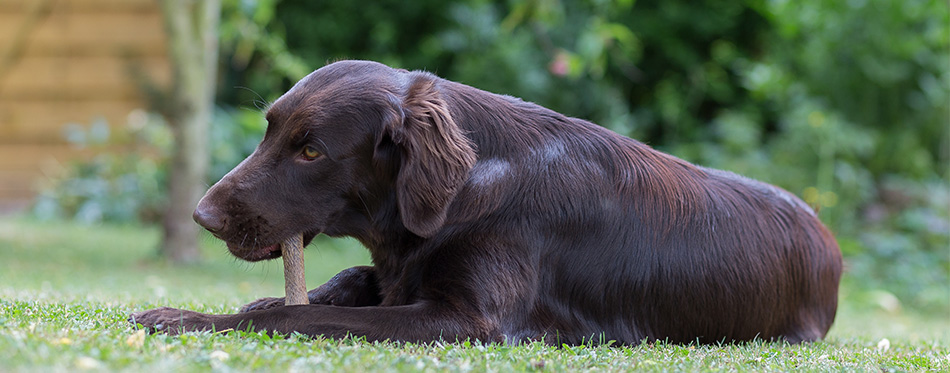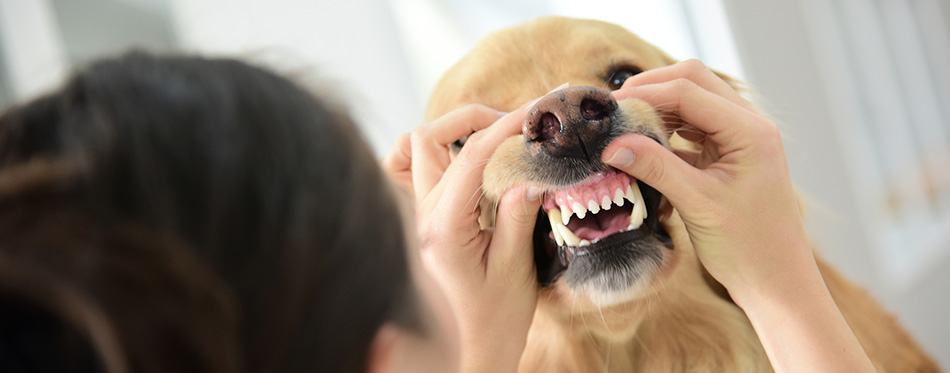Grinding teeth is a common habit of humans, but if your pup is doing the same, it might not be something you want to overlook. When it comes to canines, teeth grinding is a sign of stress, pain or even a serious health condition. Plus, the habit itself, when ignored, can lead to worse dental issues like tooth fractures or infections. Thus, dog owners need to watch out when their pet is displaying this behavior.

Teeth Grinding in Dogs
This condition is officially called bruxism, where dogs rub the upper and lower teeth together repeatedly. Doing so is dangerous for their tooth enamel, as this action tends to run it down. As a result, the pulp gets exposed, the teeth may get fractured and infected, and the pet may experience pain in the teeth and gums. This is why it is important to get pups checked out by the veterinary dentist as soon as possible to get to the bottom of this behavior.
There are quite a few reasons why canines grind their teeth and identifying this root cause is part of the treatment plan to stop this habit.
Reasons for Bruxism in Dogs
Dogs grind their teeth because of both physiological and psychological reasons. Identifying which one of these can help vets and pet owners stop this habit and protect their pups’ teeth.
- Loose tooth
Puppies also lose their first teeth much like children do. By the time they are over 8 months old, their 42 adult teeth start to come out. Thus, if your pooch is well over this age and has loose teeth, it is a sign of trauma or advanced periodontal disease. This is the time to go to the vet to get the loose tooth checked out.
- Misaligned teeth
Crooked teeth can bring problems with chewing and drinking. You may also notice an overbite or the lower jaw protruding. Worse, the pup may be unable to close its mouth due to the misaligned teeth.
Beyond these issues, the teeth might rub against some soft tissues inside the mouth and cause sores. The vet may recommend removing the tooth or if possible, cap it to prevent future problems.
You may also like our article on Dog Chews and Chew & Teething Toys for Puppies
- Stress and anxiety
A psychological issue can be the reason behind your pet’s teeth grinding. They can easily feel stress and anxiety, like when there are significant changes at home. Going to the vet can help you identify the cause of their anxious behavior before the teeth grinding causes irreparable damage.
- Pain
This behavior might also be a sign of some hidden pain or condition you are not aware of. At times, issues with the mouth or stomach might make your pup grind its teeth. Again, the vet can work on clarifying this issue and finding ways to address it.
Take a look at our review of Dog Dental Spray.
What to Do If Your Dog Grinds Its Teeth
It is important to make an appointment with the vet whenever you notice your pup grinding its teeth. The vet will first do a thorough assessment of its teeth and gums for some dental conditions. If necessary, a dental x-ray might be done by the vet. Dental problems are quite common with canines but only a professional veterinary orthodontist can really make an accurate diagnosis.
In cases where the problem is not related to dental issues or stress, an examination might be done. Bruxism might also be due to abdominal problems or issues with other parts of its body. The vet might prescribe temporary relief for the pain to stop the teeth grinding.
When the habit is linked to stress, the vet will suggest making changes to address the problem, including having a spot where they can relax and retreat to. If necessary, a supplement to reduce stress like tryptophan can help greatly. They have been proven to improve levels of serotonin, which will decrease the levels of stress and anxiety. Behavioral therapy might also help in such cases.
Head over to our review of Calming Supplements for Dogs for more options.

How to Avoid Teeth Grinding in Dogs
It is best not to wait until your pooch develops this habit before you address the underlying causes. The cost of this behavior can be very high because dog teeth can be permanently damaged and other health issues can have long-term effects. Even if the issue is a simple misalignment of teeth, the problem can get worse until the tooth is removed. Permanent teeth, unfortunately, do not grow back
Avoiding bruxism involves a few steps. It includes a physical inspection, a healthy and balanced diet, and social interaction with other dogs.
- Diet and exercise
A happy and healthy dog will not resort to teeth grinding. It will also generally keep it free from lots of medical conditions. Thus, the first step is to always provide your pet with the right diet that has the nutrition it needs. With it, exercise is necessary to keep your pup physically and mentally healthy. Keeping it stimulated will prevent the development of destructive behaviors. Lastly, getting your pooch checked by the vet regularly will address any health issues before it causes pain.
- Social interaction
Dogs are social beings and when they are properly socialized, they maintain mental health and prevent anxiety. In some situations, obedience training can lower levels of anxiety in pups, as they learn how to build relationships and establish trust. You should also try to avoid situations or places that seem to trigger fear. Pups also need peace and quiet to remain healthy and happy.
- Physical inspection
Any dental problems or health conditions can be treated early if the dog is seen by the vet before it gets worse. Because your pet cannot talk and tell you that something is wrong or painful, owners like you simply need to be attentive to signs and proactive in going to the vet. Even if your pup is found to be in the clear, it is to hear it from an expert instead of waiting until it is too late.
Teeth grinding is not a normal habit of dogs, which is why seeing your pooch doing this should alarm you, the owner. If caught early enough, then permanent damage and problems can be avoided.

